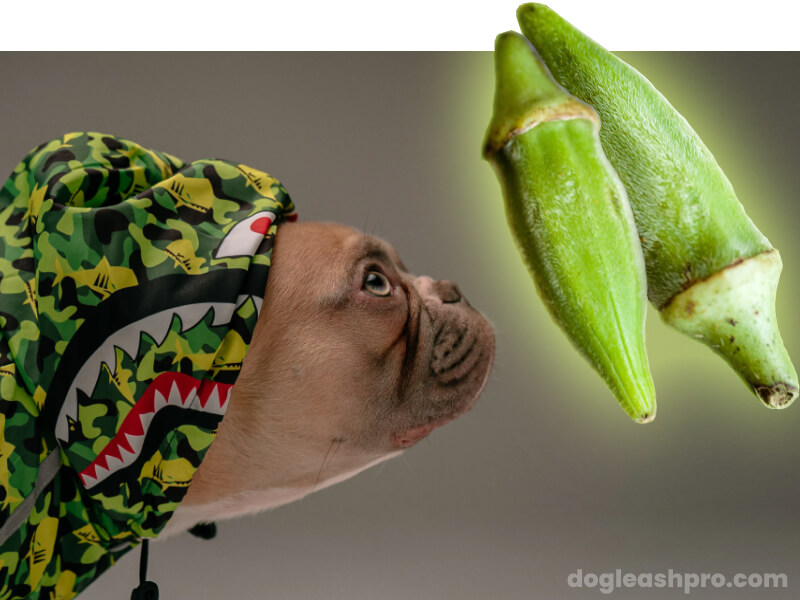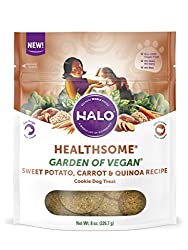
A short and direct answer is yes, dogs can eat Okra. Okra is safe and non-toxic if consumed in moderation and prepared properly. It has numerous minerals, vitamins, and nutrients that are useful in keeping dogs healthy.
Similar to feeding other types of vegetables like Brussel sprouts to your pooch, proper preparation is key. There are a few things a dog owner must know before feeding Okra to their dogs. A proper understanding can help you to effectively incorporate Okra into your dog’s diet and help prevent undesirable outcomes.
Moreover, if you are feeding Okra to your pooch for the first time, you may want to feed them a small portion first. Afterward, observe your pup throughout the day to see if he is experiencing any adverse reactions.
Table of Contents
What is Okra?
Okra is an herbaceous plant belonging to the mallow family, making it related to hibiscus and cotton. It is a vital plant in many countries as they use most of its parts in a variety of ways. Moreover, like Goji berries, it also contains a high nutritional value. It is a good source of the following:
- Vitamin K
- Vitamin A
- Vitamin B6
- Vitamin C
- Iron
- Calcium
- Magnesium
- Potassium
- Protein
- Folic Acid
- Fiber
- Antioxidants
In addition, Okra grows in warm climates and can be available all year round, with summer as the peak season. According to several studies, after discovering this in Ethiopia in the 12th century, ancient Egyptians cultivated it and spread it in the neighboring regions.
Moreover, Okra is currently popular in:
- Southern parts of the US
- South America
- The Caribbean
- Middle East
- Africa
What are the different types of Okra?
There are several types of Okra, and each has its distinct characteristics. The most popular types of Okra include:
- Clemson Spineless. This type of Okra is spineless with a curved-shaped pod. It is dark green. Being spineless is an attractive quality for Okra plants, making this type the most popular.
- Burgundy. This type is one of the most attractive Okra plants due to its wine-red colored stems that match the vein of the leaves. Additionally, its pods are large and crimson.
- Jambalaya. This is one of the compact kinds of Okra that is excellent for canning. It’s great if you’re making jambalaya.
- Star of David. This is a heritage variety of the Okra plant that has been around for ages. Moreover, this type of Okra comes with spines and attractive purple leaves.
What types of Okra can dogs eat?

Dogs can eat any type of Okra like humans do. However, a key difference is that like many human foods, the fried Okra dish typically contains ingredients that are toxic to dogs, namely garlic, onion, and spices.
Cooking Okra this way is not good for dogs. Hence, raw Okra, no matter which type, is the best way to serve your pups.
Is Okra good for dogs?
Yes, Okra contains a lot of nutrients that are beneficial for dogs. It can also be a substitute for meat products since it is high in protein.
Furthermore, Okra is packed with vitamins, minerals, and healthy fats, which provides a good addition to your dog’s balanced diet. Still, even if Okra is good for dogs, it should only be consumed in moderation.
Dogs should still get their needed nutrients from their regular dog food that includes meat such as chicken since it is their natural source of protein.
Nutritional benefit of Okra for dogs
Okra contains a lot of nutrients that are beneficial for dogs. Some of these nutritional benefits include:
- Protein. Okra is an alternative source of protein for a dog’s diet.
- Vitamins and minerals. Okra is packed with vitamins B6, C, A, and K. These vitamins and minerals help to boost your canine’s immune system and keep them healthy.
- Dietary fibers. This is good for the gastrointestinal tract in preventing and treating ulcers. It can also help to soften your pup’s stool.
- Antioxidants. This helps improve your dog’s immune system. Furthermore, antioxidants help adult dogs restore their active muscles and help with inflammation.
- Purgative properties. Okra has mucilage to eliminate toxic substances from your canine’s body.
When shouldn’t you feed Okra to your dog?

Despite the nutritional benefits of Okra, there are certain instances where you should not give Okra to your pups. Let’s discuss each of these instances in detail.
- Digestive issues. Even if dogs can safely eat Okra, too much Okra can cause problems with their digestion. It is best not to give Okra and any other vegetable as it can make the condition worse.
- Dog dislike sticky and slimy foods. The inside of the Okra is slimy and sticky, which can cause problems for dogs who can’t consume slimy foods. If your pooch dislikes or can’t eat slimy food, take Okra off your dog’s diet.
- Fried Okra. Please do not feed your pup fried foods. Cooked Okra, especially fried, increases the fat content of the food, which can make the dog obese and have digestive problems. Generally, fried foods are not advisable for dogs. It also reduces the nutritional value of the food.
- Adding butter or spices to the Okra. Garlic, onion, and spices are all toxic to dogs. Consuming food with these added flavors can cause digestive problems in dogs. Furthermore, onion can cause anemia in dogs.
Keep in mind that excessive human food consumption can negatively affect the dog’s health. It’s best to assess your pup’s nutritional needs first and ensure that they are getting the majority of their nutrients from appropriate dog food.
How to best serve Okra to dogs?
It’s best to only serve raw Okra to dogs. Cooked Okra can also be an option, given that it is not fried. Furthermore, the use of salt and spices can also be harmful to dogs. Boiled or steamed Okra without any added flavors or additives is the best way to serve cooked Okra to dogs.
Make sure you’re only giving Okra to dogs in moderation. Giving too much Okra, just like any other food and vegetables, can cause digestive issues in dogs.
How much Okra can my dog have?
You should only give your pup a small amount as an occasional treat. It is not something you give to your pooch every day. If you’re not sure, it is wise to contact your vet first to ask for their professional opinions. Remember, eating too much Okra can cause digestive problems in dogs.
What if my dog accidentally consumes a lot of Okra?
Accidentally eating a lot of Okra can be problematic in dogs. It can cause food poisoning and digestive problems. After consuming a lot of Okra, observe your dog’s behavior and see if there are any symptoms of distress. Do not give him anymore Okra for at least a couple of days as a precaution to prevent problems.
If your four-legged friend displays symptoms of digestive issues, contact your vet immediately.
Is Okra bad for dogs?
No, Okra is not bad for dogs as it is not toxic. Dogs can benefit a lot from the nutrients that Okra has to offer, which can help improve their overall health and wellness. However, avoid giving too much to your dog.
Okra and possible health issues
Even if Okra contains various vitamins, minerals, and other nutrients, too much consumption can still cause problems. For dogs, consuming too many Okra can cause the following issues:
- Bloated stomachs.
- Gas.
- Diarrhea.
- Gastrointestinal distress.
Furthermore, fried or cooked Okra with onion, garlic, butter, and other spices can also upset the dog’s stomach and cause digestive problems, even if you’re giving just a small amount.
While Okra is non-toxic, some dogs may be allergic to it. Even if your dog is enjoying Okra and does not show any sign of allergy, it may take effect as they grow older. Moreover, some allergies in dogs tend to build up and just manifest later on in their life.
Canine-friendly alternative to Okra
You can include other vegetables as a treat or a part of your dog’s diet. These includes:
- Asparagus.
- Celery.
- Cucumber.
Even if these vegetables are rich in nutrients, you should still give them to your dog in moderation. It is also wise to ask your veterinarian for their professional opinions before giving these vegetables to your precious pooch.
We prefer to feed our pooch the following dog-friendly treats as an alternative to Okra:
So, can dogs eat Okra?
Okras are non-toxic. They contain a high nutritional value with various types of vitamins. Hence, it is safe to give dogs Okra as it can further improve their overall health. However, too much consumption of it is still not good.
It’s best to give only a small amount of Okra to your canine and avoid making it a daily routine. Furthermore, the best serving of Okra is raw as it is free from oil and spices that can be harmful to dogs.
Related Questions
No, dogs should not eat fried Okra. Frying the food increases the food’s fat content because of the oil. This can lead to obesity and digestive problems in dogs. Furthermore, it decreases the nutrition of the food.
No, dogs should not eat pickled Okra. Pickled Okra and other pickled foods are not advisable to dogs since they may contain salt and spices that may cause digestive problems in dogs. Furthermore, onion is one of the main ingredients in pickled foods and it is very harmful to dogs as it can cause anemia.
Yes, raw Okra is the ideal form of Okra for dogs. The natural state of Okra is very safe for dogs since it doesn’t have additives such as onion, garlic, and other spices.
However, before giving raw Okra to your pups, make sure they don’t have any problems with the sticky and slimy texture of the inside of the Okra. Make sure to only feed your dog Okra in moderation. Too much Okra may cause digestive problems.
Yes, dogs can eat cooked Okra without any additives such as onion, garlic, and other spices. Fried Okra is also not an option. Keep the cooking plain and simple such as boiling or steaming it without the spices. The use of spices can cause digestive problems and diarrhea in dogs.
Yes, Okra seeds are safe for dogs to eat. However, Okra seeds have a slimy and sticky texture that some dogs may not be fond of. So, they may not be best for dogs that dislike eating slimy foods.
DISCLAIMER: THIS WEBSITE DOES NOT PROVIDE MEDICAL ADVICE
The information, including but not limited to, text, graphics, images and other material contained on this website are for informational purposes only. No material on this site is intended to be a substitute for professional veterinary advice, diagnosis, or treatment. Always seek the advice of your veterinarian or other qualified health care provider with any questions you may have regarding dietary needs.
Resources:
https://en.wikipedia.org/wiki/Okra

With over five years of specialized experience as an animal writer, my expertise lies in dog nutrition, health, behavior, grooming, and training. I am dedicated to delivering helpful and informative content that caters to the well-being of our furry friends. My primary goal is to empower pet owners with knowledge and ensure our canine companions thrive in health and happiness. In my free time, I love volunteering at local dog rescue centers.










